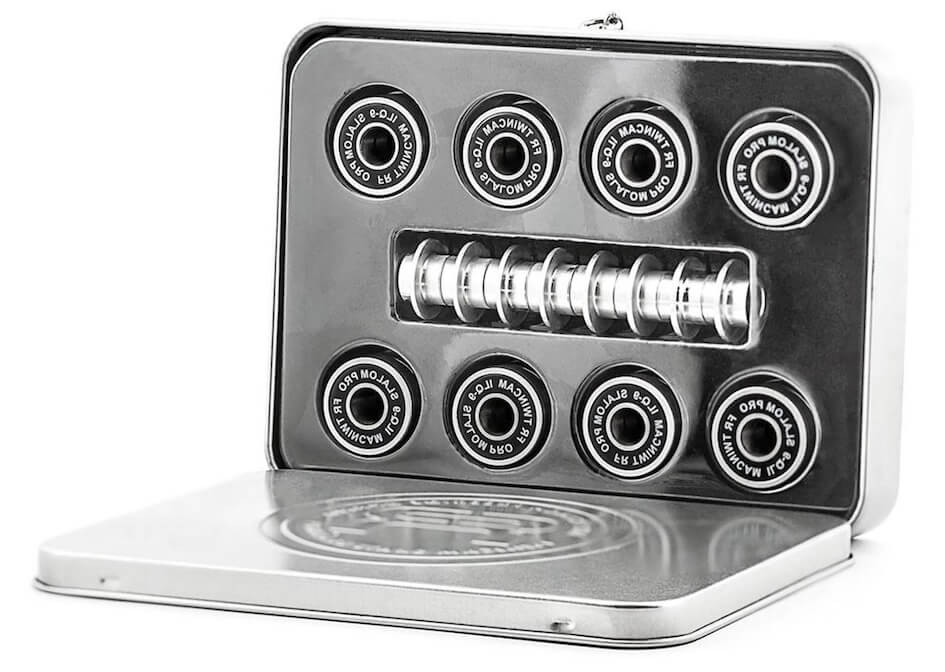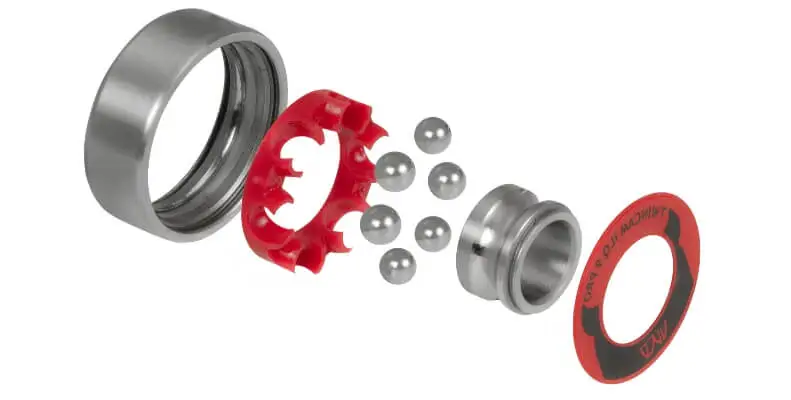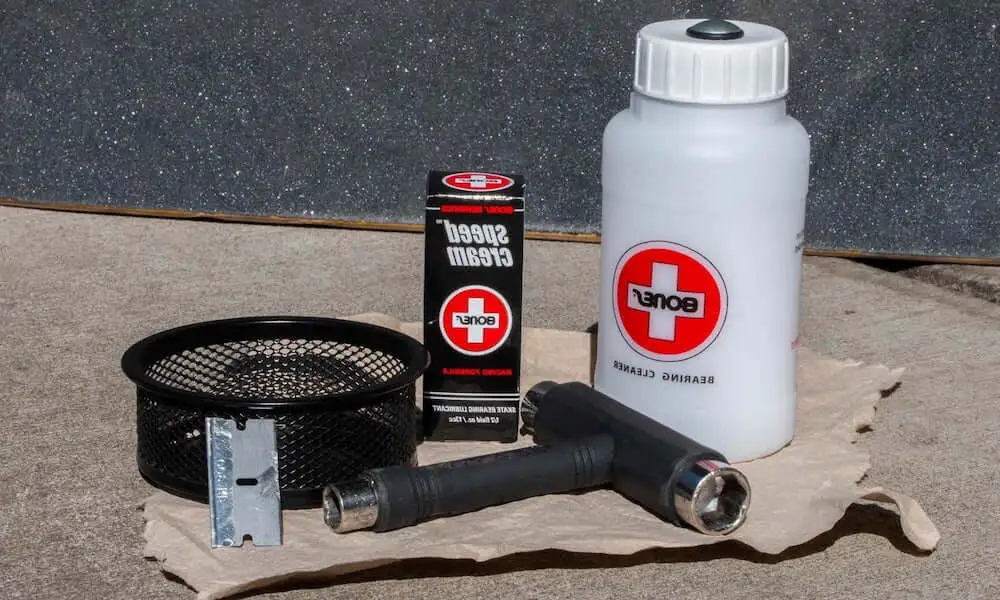Guide to roller and inline skate bearings 2024

Without bearings, either roller skates or inline skates cannot work to their fullest potential for these allow them to roll smoothly, maintaining speed. These bearings have an inner and outer ring, a set of balls or rollers, and a cage that spaces them out evenly. The bearings' balls or rollers decrease friction and allow the wheels to rotate easily with very little resistance.
The ABEC system rates bearings from ABEC-1 to ABEC-9 on their precision and performance, but the higher the rating does not guarantee it will be a smooth bearing with less friction. Bearing performance will be influenced by the materials used in its construction and the lubrication applied. ILQ rating is now common in skate bearings and measures speed, durability, and precision. ILQ bearings are rated from 1 through 9, with the larger number denoting increased performance.
You want to make sure you have the right bearings for your inline or roller skates. First, choose good, high-quality bearings that will provide a smooth, consistent roll for that type of skating. This may be the ABEC or ILQ rating, but most of the bearing materials used, lubrication, and construction quality are quite important.
Other considerations in the choice of bearings include the material they are made of, lubrication applied, and shield or seal from dirt and other debris.
Now, let's discuss ceramic bearings: Ceramic bearings are touted as the best available option for skating because they are light, hard-wearing, and really spin faster than steel bearings. They do come at a price premium and likely won't make a bit of difference to casual skaters.
Swiss bearings are considered to be one of the finest brands of roller skate bearings that show the highest quality and precision. Swiss bearings have normally high-grade steel balls and races; most often, they are constructed to a tighter tolerance than other bearings. Swiss bearings are designed to hold up to high speeds and usually perform flawlessly under large loads. They roll very smoothly and consistently, which is important when a skater has to maintain speed and keep control.
Most of the Swiss bearings come rated between ABEC-7 and ABEC-9 under this rating system. While it would in principle mean a great deal toward accuracy and performance, it is not quite noted that an ABEC rating does not represent everything when it comes to bearing quality, and other factors, such as material used and lubrication level, can further affect bearing performance.
Overall, Swiss bearings are favored by serious skaters who commit themselves to high-quality, trustworthy bearings that can support their sport. Generally, Swiss bearings may be much more expensive than other bearings and therefore may not be required by casual skaters not looking to engage in very amplified performances.
Proper Care: The proper care for your bearings would include cleaning them regularly and adding lubrication when needed. You can remove the shields or seals and clean out whatever dirt and debris may be inside, using a solvent, then put a drop or two of lubricant onto the balls or rollers.
If you are a serious skater, then good-quality bearings are worth the investment; they can really make some difference. However, even budget bearings can run well if properly maintained.

Best bearings for roller and inline skates
The best bearings for skates are those that offer a smooth, consistent roll, are durable, and are easy to maintain. Here are the most popular ones:
- Bones Swiss: Most of the time, these Bones Swiss bearings are regarded as the gold standard between all bearings there are for inline skates. They mainly make their bearings from quality materials, including high-grade steel balls and races, where a really tight tolerance exists for huge precision and performance.
- SKF Bearings: SKF bearings are of top-notch quality and are guaranteed durable. Usually used in the heavy industrial niche, they can bear great pressure together with high speed. They are also impervious to dirt or debris, making them suitable for outdoor skating.
- TwinCam bearings represent a smooth, frictionless run and are made specially for inline skating. TwinCam bearings are built originally with free, smooth rolling of the balls, because of which speed facilitation and reduction of friction can be done simultaneously. Known mostly for ILQ as a patented standard and also produces the usual ABEC.
- ILQ bearings (standard, not a brand): ILQ bearings are made by the popular skate brand Twincam and are a popular choice for recreational and fitness skaters. They are affordable, durable, and offer a smooth roll. They have 6 balls instead of 7 in Abec.
- FR Skates bearings: their MW9 and MW Titalium bearings are really great. Actually MW it's the same as ILQ and made by Twincam.
- Micro skate bearings: Their best model is Micro Twincam ILQ9 Pro made by Twincam either. They have many own budget models such as Micro Pro Slalom 9 and standard Micro Abec7.
- BSB bearings: known brand with their real SWISS quality. Actually, best quality ABEC (standard) bearings that we know. I prefer their Abec7 and Abec9, while the BSB Swiss is one of the best(though can't be found in 2023).
Here are some other popular options for bearings:
- Kwik bearings: Kwik bearings are the second most used bearings among roller derby skaters. Known for precision and speed, they are put under the stern test required in the sport.
- Bones Reds: A more affordable version from the makers of Bones Swiss bearings, these have a smooth roll and are popular among beginners and intermediate-level skaters.
- Bronson Speed Co. bearings: It's again one of the newer bearings on the skate market, but it has built up a following quite quickly with skaters lately. They are known to be fast and durable, thus suitable for street and park skating.
Ultimately, the best bearings for inline skates and roller skates will depend on your specific needs and preferences. If serious skaters want to get the best performance out of products such as Bones Swiss or SKF bearings, they can put in the extra cost. A casual skater can opt for a more pocket-friendly version, for example, TwinCam or ILQ bearings.
Bearing sizes may vary, so the following is for understanding the bearing sizes on roller skates:
The bearing size for roller skates is typically standardized and is known as 608 size bearings. The 608 size bearing is 22mm in diameter, 7mm wide, and has an 8mm bore (inner diameter). This is the most common size for roller skate bearings and is used by most skate manufacturers. Actually, all bearings on our website are them as they fit all modern wheels for inline skates nowadays.
Worth noting, while the most common bearings are the 608-sized ones, not all bearings are created equal. Be it in the quality of materials, high tolerances during the manufacturing process, or even the type of lubrication used, it all impacts how well a bearing will work. In choosing bearings for roller skates, consider the specific needs of the skating style in question, and quality bearings will provide one with a smooth, continuous roll.

How to remove bearings from roller and inline skate wheels
Notice the following steps that can help you out in removing bearings from roller skates or inline skates:
- Take off wheels: Unscrew and remove axles by using a skate tool or wrench.
- Take bearings out: Insert the special press for bearings (less common) or Tool (the one you had with your skates) into the wheel and press the bearing out.
- Clean bearings: Wipe off any residual dirt after taking the bearings out with a soft clean cloth or paper towel. Or use a bearing cleaner.
- Inspect the bearings: Inspect each bearing for damage. Covers bent, replace. At least take them off and use bearings without.
- Put the skates back together.
This process is not that complicated at all for reinstallation of bearings from a roller skate or an inline skate. However, one shall show patience and caution to avoid the damaging of bearings, or inversely, your skate wheels.
